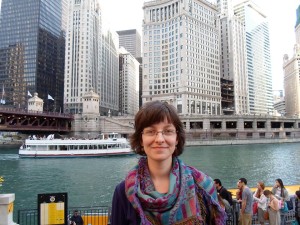This month CCH has hosted two organizing fellows from Central Europe. The Great Lakes Consortium (GLC) for International Training and Development manages the organizers’ exchange, a program sponsored by the U.S. State Department’s Bureau of Educational and Cultural Affairs. CCH previously hosted six organizers through the program in 2012 and 2013.
By Johanna Laszlo, Professional Fellowship Program
I am a social worker from Hungary, where I work at the Hungarian Anti-Poverty Network (HAPN) in Budapest as a program manager of campaigns that draw attention to income poverty. The focus of my interest – also the topic of my Ph.D dissertation, since I am about to finish my doctoral studies – is how to engage people with a social change. The idea of an inclusive society is not only professionally, but personally important for me as well. I have gained so much from interacting with people with various backgrounds, listening to their stories and sharing mine.

Having the opportunity of talking to homeless mothers and youth of Chicago in the last weeks had a deep impression on me. I was especially touched by the story of a young woman, homeless during her high school years, who tried to help her mother to raise up her little siblings. Even though she was still homeless, she finished her college education as well. Right now she is planning to participate in a Ph.D program – and I am sure she will succeed. I felt touched by her words and I recognized again that listening to the life stories of people like her empowers me too.
My job at HAPN means multi-level challenges: building relationships with people experiencing poverty, bringing together the potential allies and coordinating the investment of efforts in order to reach our common goals, running campaigns, and lobbying. For this job it is necessary to have many different kinds of skills and knowledge about several empowering methods and techniques. In order to deepen my knowledge in this field, I wanted to be trained at an organization which has a similar profile to HAPN, and which is active both in directly empowering people experiencing poverty, in policy work and advocacy as well.
I found Chicago Coalition for the Homeless (CCH) a perfect place to learn all of these. I am especially interested in studying how its Speakers Bureau works, and the practice of how to build up effective coalitions.
The Speakers Bureau is a speaking team of people who have experienced homelessness, people who are ready to share their stories. The CCH Speakers Bureau is effective on several levels: It is a powerful tool to involve people experiencing poverty into the work of the organization. Its events offer a great opportunity to reach many people at the same time. Finally, the speakers can make a deep impression on decision-makers, legislators, and media when they hear the speakers’ testimonies.
In addition to people directly influenced by poverty in local communities, it is essential to involve allies as well. CCH does this, too: Service providers and other advocacy and organizing groups are invited to the coalition to work together for the change. This empowering, partnership-based, multi-level approach is exactly what I would like to employ to strengthen the work done in my country.
